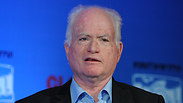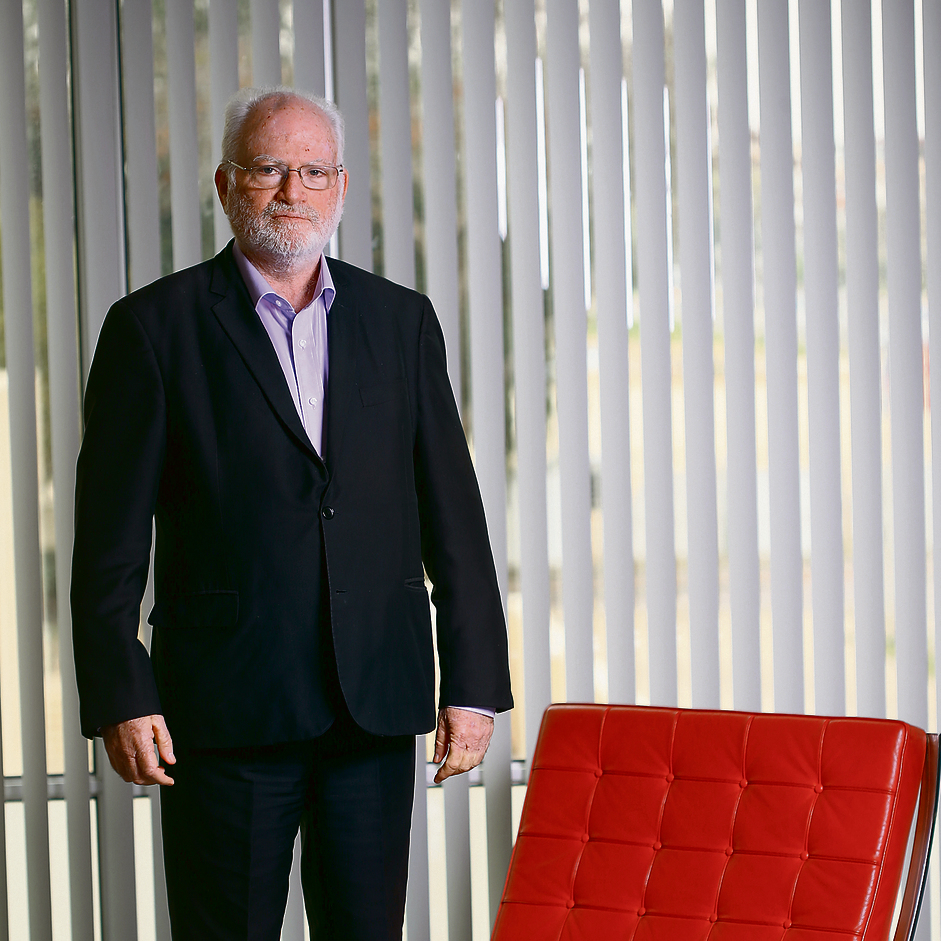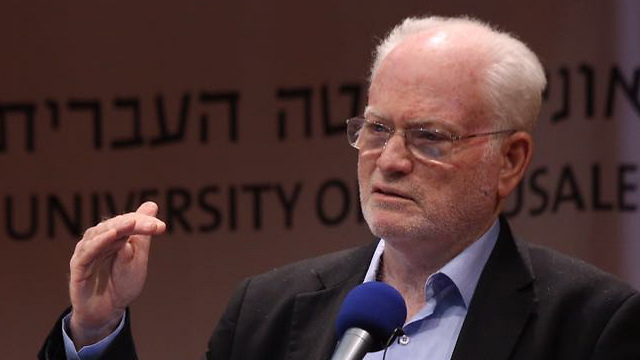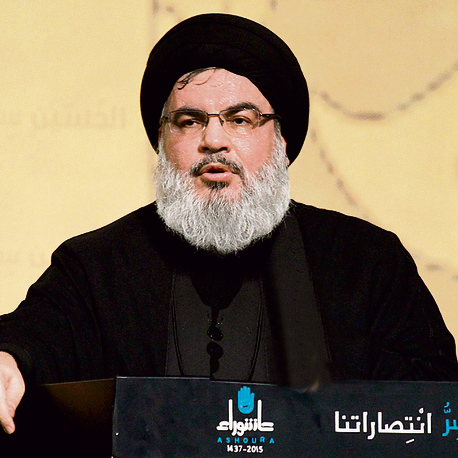
I will even miss my enemies, says retired general Amos Gilad
As head of the Defense Ministry's Political-Military Affairs Bureau and as a secret emissary to Arab countries, Gilad made quite a few friends in the Arab world. In his long career as an intelligence officer, he got to know some of Israel’s most bitter enemies. In a special interview following his retirement, he reveals how he was almost lynched by angry Palestinians and how he prevented a war with Syria.
Were there other incidents in which your life was in danger?
“There were all kinds of situations. An explosive device was planted under my vehicle at the Philadelphi Route. And in Lebanon, in the summer of 1982, when I was an officer in the Military Intelligence Directorate, presidential candidate Bachir Gemayel wanted to impress me, invited me to ride in his car and drove me himself. But he was unfamiliar with the streets of Beirut and drove fast towards a Syrian roadblock. It was only at the last moment that he hit the brakes and turned the wheel, so the Syrian soldiers were unable to see who was in the car. Several weeks later, Bachir was assassinated by the Syrians.
“And there was the event I won’t forget, in 1993, when I was the official emissary to Yasser Arafat in Tunisia regarding the missing IDF soldiers. In the middle of the meeting, they received a report from Gaza about the IDF hitting the Fatah Hawks. I had no idea what was going on, but the Palestinians began threatening and running wild, on the verge of losing control. Mohammed Dahlan—then the head of the Preventive Security Force in Gaza—was there, and those who were killed were his friends. I said to myself, ‘Keep calm and ignore their demands to apologize.’ I would never say a bad word about the IDF.”
That same year, Gilad found himself in another incident, in Tunisia again, before the signing of the Oslo Agreements. “At that exact time, there were reports that the Mossad had planted listening devices in an armchair and a lamp in Abu Mazen’s (Mahmoud Abbas) office,” he says.
“It created a big drama there, and I was stuck in that same office. I was summoned to a meeting with the security chief, Hakam Balawi, who demanded explanations. I said to him, ‘I don’t know what you’re talking about, and I don’t work in the Mossad.’ He didn’t believe me, because in the Palestinians' eyes, I was ‘Mr. Intelligence.’”
He was labeled as “Mr. Intelligence,” an officer with firm opinions and a direct and blatant style, in Israel too. The Palestinians, on the other hand, called him “Mr. No.” When he served as coordinator of the government’s activities in the territories and put together the list of food products that were allowed into the Strip, the Palestinians complained that he had compiled a basket of essential products only, without any candy, chocolate or toiletries for women.
Now, at the age of 64, Gilad is retiring after 45 years in the IDF and in the Defense Ministry, in which he served as head of the Military Intelligence Research Division, coordinator of the government’s activities in the territories, the IDF spokesman, an open and secret emissary to Egypt, Jordan and the Palestinians, and in the past 13 years—as director of the Defense Ministry's Political-Military Affairs Bureau.

“This bureau,” Gilad explains in a retirement interview, “is responsible for the State of Israel’s special political-security relations, for the security exports policy, for international treaties, as well as for the relations with the United States, with countries in the Middle East, with Turkey, with the Far East, etc. It means working around the clock. I did wonderful secret things there, and that’s why I stayed for so long.
“But after so many years, I reached a state of exhaustion. When Prof. Uriel Reichman suggested that I run the School of Government at the Interdisciplinary Center and head the Herzliya Conference, I saw it as a challenge. I decided that I was embarking on a new road and I bid farewell to everyone in a friendly manner.”
Still, people say that Defense Minister Avigdor Lieberman showed you the door.
“So they say. There are always stories in the Middle East. Let’s just say that when I told him I wanted to retire, he didn’t stand in my way.”
Did you get any messages of regret from your Arab colleagues?
“I won’t elaborate on what the Egyptians, the Jordanians and the Turks said to me, because that would be a betrayal of trust. I got written and oral messages. I was moved by all the warm words I heard.”
‘Arab leaders should not be threatened’
We sit on the third floor of the School of Government at the Interdisciplinary Center. The office is empty. There is only a telephone, two tables and a computer, and a bookcase waiting to be filled. Gilad has only been here for three weeks and has already been to two conference in Europe, from where he will start to gather speakers for the Herzliya Conference, which will be held in three months. He will have a hard time, however, recruiting the VIPs from the Arab world, who he knows very well from decades of secret meetings.
“Normal relations with the Arab world are a very important matter, but I believe it’s unattainable. First of all, you must create a climate for normalization, and that won’t work if there is no agreement with the Palestinians. I have a dream, that our chief of staff is invited to Cairo, that he is greeted with an honor parade at the airport, and that the Egyptian chief of staff or defense minister visit us. And of course, that President (Abdel Fattah) al-Sisi visits and invites our president. That’s the dream, and it’s not going be fulfilled any time soon.”
Why basically?
“After the Arab Spring, the Arab leaders have to—for their stability—take the street’s covert feelings into account. I also suggest that we avoid threatening or demanding any normalization activities they are incapable of carrying out and are uninterested in as a condition for security collaborations with us. We must first of all take care of the security of Israel’s citizens.
“The peace process with the Palestinians is stuck and that’s a tragedy. We have to make a greater effort. Some of us say that (Prime Minister Benjamin) Netanyahu is responsible, some say Abbas doesn’t want it. You’re asking whose fault it is? Every leader is responsible for his own area.
“I believe that the process should have been utilized to the fullest, because the strategic map is convenient and we have good relations with Arab states which are willing to support and influence the Palestinians. But if unilateral moves are carried out, it will cause irreversible damage, because no Arab state will give up on the basic outline: The 1967 borders and Jerusalem’s division.”
What do you think went through Abbas’ mind when he heard US President Donald Trump suggesting that we choose between one or two states, and President Reuven Rivlin talking about annexing lands?
“These are crazy illusions. Abbas won’t live with one state and won’t accept an annexation. If these ideas are fulfilled, we might get caught in a very complicated situation. The absence of a peace process is very dangerous, because Abbas allows the security coordination. The void inspires radical ideas like annexation and damages our security achievements in preventing terror. If we push the Palestinians into a corner, the security cooperation could suffer. I doubt that we will be able to reach an agreement with them, but we have to manage a process.
“As for the annexation, I don’t know a Palestinian who will agree to one state, unless he is promised full rights, which means voting for the Knesset, which means the destruction of the State of Israel. If they are allowed to vote for the Knesset, the Zionist vision will collapse. Annexation is an irreversible situation, which will push them into a corner, without hope. It won’t be accepted by the world and will negatively project on the Arab states. As stable as their regimes may be, they are very sensitive to public opinion.”
What kind of relationship did you develop with Abbas?
“I can’t pick up the phone and call him, and we didn’t develop personal relations. It’s the acceptable code of behavior when you work with them.”
So let’s talk about Abbas.
“First, I have to go back to his predecessor. I had the privilege of warning against Arafat. I still think he was an arch-terrorist, and I repeat it time and again. In the ‘peace of the brave,’ which Arafat spoke about, he meant that Israel would no longer exist. With Abbas, it’s different. He doesn’t like Israel, and he fights us in international institutions, but he made a decision not to engage in terror, which is why he legitimizes the security coordination.
“But don’t get me wrong: Abbas is not a collaborator of Israel. As far as he is concerned, the security coordination is aimed at serving the Palestinians' interests. Nevertheless, a calm in the territories is unimaginable without the IDF, without the Military Intelligence Directorate, without the Shin Bet. They are the ones responsible for the security.”
Abbas will soon be 82 years old. Sooner or later, he will vacate his seat. What will happen then.
“Any Palestinian leader who replaces him will be more radical. I’m not even certain that there will only be one leader. It’s possible that they will form a leadership trio and divide the authorities between the leader of Fatah, the leader of the PLO and the Palestinian Authority chairman. I still can’t point to their next leader, because Abbas isn’t training a successor. He has now appointed a deputy, Mahmoud al-Aloul, and I won’t express my opinion because I don’t want to dishonor him.
“There are a few contenders, and none of them—from what I’m seeing—will accept someone else’s leadership. It may develop into a chaotic situation. If Abbas goes without a defined successor, and the rule is divided between three leaders who will quarrel amongst themselves, Hamas will grow stronger at Fatah’s expense because they are aiming to take over the West Bank. Today it’s difficult because Abbas understands who they are, and the IDF is in control.”
‘The only enemy I warn against is the hubris sin’
Even after his retirement. Gilad remains plainspoken, and his world is divided between good guys and bad guys. “As a person who grew up in intelligence, I am always skeptic and distrustful,” he says.
Whoever knows you knows that Jordan is your weak spot. You make sure to cover your relationship with them with a veil of secrecy and use every opportunity to defend them.
“Jordan is a fascinating issue. When Hussein was crowned kind in 1952, hundreds of assessors made a living from forecasts about his murder and the regime’s collapse. There was also an idea in Israel to establish a Palestinian regime in the kingdom as a solution to the Israeli-Palestinian conflict. This whole perception of Jordan as an alternative Palestinian state is foolish. I have real nightmares about this issue. If Arafat and other had controlled Jordan, our live would have turned into a security hell.
“Today, one-third of the population in Jordan is comprised of refugees: The Palestinian refugees, the refugees from Iraq and the refugees of the war in Syria. And contrary to what people thing, the regime is stable. Jordan is the center of gravity for stability in the Middle East, and we must do everything, all the time, to prevent a turmoil there. We had the Temple Mount events, when right-wing politicians and activists insisted on going up there and inflaming the situation, and it was perceived on the Jordanian side as a threat. And then Prime Minister Netanyahu intervened, and things calmed down.”
Let’s go back to Egypt. I’m guessing that you know al-Sisi from your previous positions in the army.
“In my eyes, al-Sisi is a miracle. I knew him even before he was elected president. He is determined, devoted and very honest. An Egyptian patriot and a religious person. When the Muslim Brotherhood rose to power, they gave him a five-star rank of field marshal and were certain that he would do their job for them. But al-Sisi surprised and got rid of them, despite pressures from the Western countries, including the United States. Al-Sisi, and I know this personally, reached the conclusion that if the ‘brothers’ took over and established regional alliances with similar movements, Egypt would fall into an abyss. And so, for purely patriotic reasons, he took a huge risk and removed them. He saved Egypt from the Muslim Brotherhood monster, and the entire region from a historical disaster.”
Tell us a story from Egypt we’re not familiar with.
“In 2000, during an open visit to Egypt by Defense Minister Shaul Mofaz, the Shin Bet security guard asked to sit in the car Mofaz was travelling in, but the Egyptians insisted on guarding him themselves. An argument erupted, and the Shin Bet rightfully refused to have the Israeli security guard sit in the other vehicle. They asked me to find a solution.
“I turned to Egyptian Intelligence Minister Omar Suleiman. ‘I need a personal favor,’ I said to him. ‘The Shin Bet is an outstanding organization and the VIP Protection Unit is an icon in Israel. The security guard must be attached to our defense minister.’ Suleiman was offended. ‘What, don’t you trust us?’ I told him, ‘Imagine if our security guard is not allowed to work by the rules, and something happens.’ I explained to him that the Shin Bet was very strict, and that this had nothing to do with the Egyptian security’s dignity. That’s when he softened, issued an order to let the Israeli security guard into Mofaz’s car, and the Shin Bet breathed a sigh of relief.”
What mistakes have you made over the years?
“We didn’t predict the Arab Spring. In retrospect, I can say that I felt movements and heard difficult things, but I failed to reach conclusions, just like none of the intelligence assessment bodies in the world succeeded in predicting the turmoil, the weight of the street, the expulsion of the leaders. These are depths which the intelligence bodies, not just here, are unable to reach. In general, the ability to predict internal processes in the Arab world is very limited. The predictions regarding (Syrian President Bashar) Assad’s collapse also ignored the adamant character of the Allawis.
“But don’t get me wrong. We have very strong intelligence organizations, which are working in mutual control that did not exist in the past: The Military Intelligence Directorate, which is a whole universe; the Shin Bet, which is doing a wonderful job; the coordinator of the government’s activities in the territories; the head of the Planning Directorate, who is officially responsible for the ties; the Air Force commander.
"Let’s assume that I do something foolish. Today, thanks to the mutual control, I am not alone. All the systems are involved. They are doing a wonderful job, and there is no individual who can compete with them. The only enemy I warn against is the sin of hubris. The pride and arrogance. It plays with one’s mind and leads to mistakes.
Which of your achievements would you like to talk about?
“In intelligence work, there are no soloists. We had an achievement in the early warning of the second intifada, and it’s written in the history of the system. And I am proud of my part in the Iranian issue, in turning it into the main threat in as early as 1996.
“Another achievement is my part in the affair involving Mossad agent Yehuda Gil, who delivered false reports about Syria. Fortunately, even before it turned out that he was a liar and a fraud, and before he was tried and convicted, the intelligence assessment determined that all the information regarding Syria's intentions to attack was groundless. Had we called up the reserves, Syria might have really attacked us.
“I was head of the Research Division at the time, and I remember a very senior official calling me at 11 pm and announcing that he was about to issue an order to deploy forces in order to prepare for the Syrian attack, and that he would see me at the commission of inquiry. I refused to change my assessments, and late Chief of Staff Amnon Lipkin-Shahak, who was very strict and smart, summoned me over at 7 am following Yehuda Gil’s reports.
“‘I am told that you are ignoring important warnings,’ Shahak said to me shrilly. ‘Are the accusations true?’ I said, ‘It’s true, because there are reports from observers that the Syrians are planning to attack, and I don’t accept them. The Syrians have no ability to attack us in this particular scenario, and I recommend that you ignore these reports, although the easiest thing would be not to ignore them.’ Shahak harshly interrogated me. He was a chief of staff who was familiar with every fold in the ground, an amazing field man. He questioned me for an hour, and I nearly stopped breathing. And then he said in a dry voice, ‘Okay, that’s acceptable.’ It was one of the happiest moments in my life. I managed to convince Shahak. He didn’t approve the call up, and a war was prevented.”
No gifts
What is your conclusion from the state comptroller’s report on Operation Protective Edge, which was released last week?
“Hamas, like Hezbollah, is a murderous enemy which has made it its goal to destroy Israel. When you have such an enemy, you must always be alert and ready and know how to distinguish between abilities and intentions. Hamas’ ideology changes only according to our strength or weakness against them and our ability to harm them. Nonetheless, I recommend that we focus on the threats from the north.
“In terms of the cabinet’s performance in regards to intelligence, we must find a more effective system, a really narrow forum, which will have constant access to information in order to be able to make decisions. It’s impossible to constantly update 10 ministers on sensitive information. If we have such a system, the work will be performed in a better way.”
Where do you see us in five years from now?
“We are anticipating an impressive development once the Islamic State is defeated. I expect them to be defeated in Mosul, and then in all of Iraq, and then there will be the battle against them in Syria. There is a difference between planning an attack from ISIS’s organized headquarters in ar-Raqqah and local organizations. But when they fall, Iran and Hezbollah will grow stronger. So we must already focus on strengthening and deepening our connection with the Sunni world, because the hatred towards us has disappeared even in Saudi Arabia.”
How do you see that? In conversations with them?
“I have ways of sensing it. If you listen to the spokesman of the Saudi foreign ministry, you’ll get the slogans, but there is no incitement against Israel. There is an admiration of our abilities. In the past, there was crazy incitement in Saudi Arabia. Today, the attitude has changed.”
Do you have a friend in the Arab world, a personal friend?
“There are people who I developed impressive relations with. Do I always believe them? As someone who grew up in intelligence, I am always distrustful and looking for facts. I have learned that the first thing we need is strong intelligence. And whoever claims to be a friend but harms Israel’s security, like the Lebanese phalanges did, is not a friend.
“There is Egyptian writer Alaa Al-Aswany. I have read his novel, ‘The Yacoubian Building,’ three times. If I were a member of the Nobel Prize committee, I would give him the award. I learned a lot about Egypt from this book. It’s a must-read.”
Is there an Arab colleague you will particularly miss?
“The truth is that I will even miss my rivals. In intelligence, there is a phenomenon of falling in love with enemies, because sometimes you know them better than they know themselves. I will miss everyone. The relationship with the Arabs has a lot of benefits, but the Middle East is not ready for open relations. It’s important to speak their language, and unfortunately, Arabic studies in Israel are very poor.”
I assume you received quite a lot of special gifts from Arab colleagues.
“Let me explain the situation to you: In the Arab world people give you gifts, and you can’t reject a gift because it’s customary. I was always excited by it, but throughout the years I made sure to implement our gift law. It means that you accept it, thank the person who gave it to you, and immediately hand over the gift and sign a deposition.
"If it’s a Breitling watch (like he received from the late King Hussein and the Jordanian intelligence chief), for example, it goes to a goldsmith who assesses its value and is then stored in the state’s gift reservoir. If you wish to keep the gift, the approval process will likely take three to four years. I always preferred to concede the gift with due respect. You are allowed to keep a letter, a flag, a military forces’ buckler or a picture. Those are the things I kept.”












